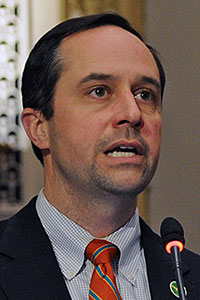
FRANKFORT, Ky. — Kentucky’s regional universities and quasi-governmental agencies could get relief from skyrocketing pension costs under legislation that passed the state Senate Wednesday by a 25-12 vote.
“It would be an understatement to say that our (Kentucky Employees Retirement System) non-hazardous pension system is in a time of crisis,” said Sen. Christian McDaniel, R-Taylor Mill. “It would further be an understatement to say that the effects of the resulting contribution rates are dramatically impacting the ability of both our universities and our social services to deliver the services that our citizens so desperately demand.”
The measure, known as House Bill 358, would make changes to the retirement plans for regional universities and quasi-governmental agencies in order to give them a financially viable mechanism to continue to operate while still paying for as much of the unfunded liability inside the pension as possible for their employees.
“There is no solution to (underfunded pensions) that doesn’t cost the general fund a significant amount of money,” said McDaniel, who is chairman of the Senate Appropriations & Revenue Committee. “But at the same time, there is no solution to this that doesn’t demand that we find a way to help these social services stay in business and help our universities reduce their burden so they can more affordably deliver a high-quality education to the young people of the commonwealth.”
The first section of the bill addresses the universities, McDaniel said. It would allow, but not require, the state’s regional universities to stop participating in the KERS by July of next year. University employees hired before 2014 could stay in KERS or join a defined contribution plan. All employees hired after 2014 would be required to join the defined contribution plan, similar to a 401(k) retirement plan.
The second section of the bill addresses the quasi-governmental agencies who participate in KERS. These agencies could also stop participating but their employees’ pensions would be frozen. They could start participating in a defined contribution plan that would also be offered to all new hires.
For groups who stopped participating in KERS, HB 358 contained formulas, in the form of loans through the retirement system, for the universities and quasi-governmental agencies to pay for their share of the unfunded liability.
Sen. Whitney Westerfield, R-Crofton, said he was voting for the bill because it would freeze the KERS employer contribution rates for the universities and quasi-governmental agencies for one more year. Those institutions have complained the pension costs were threatening their fiscal health.
“It gives those folks one further year of a reprieve on their rate before they have to start deciding what staff to cut or what services to cut,” he said. “I want to thank (McDaniel) and members of his committee for working on the bill. It is not an easy problem to solve – clearly.”
HB 358 now goes back to the House for its consideration of amendments made in the Senate.



















Add Comment